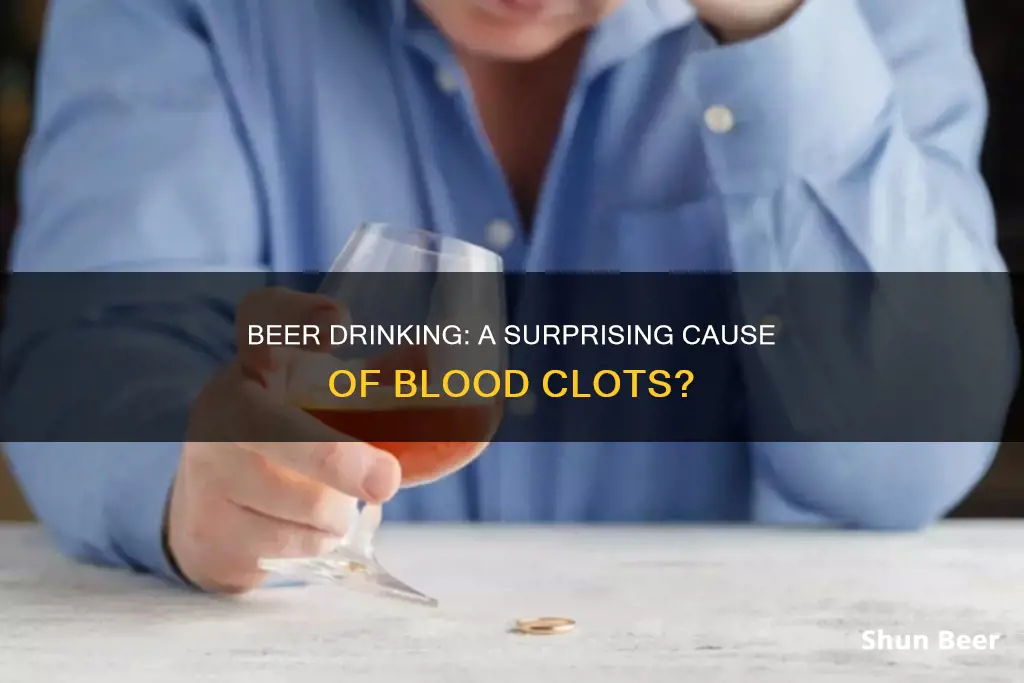
Alcohol consumption is a complex issue when it comes to blood clotting. While some studies suggest that moderate drinking can have a positive blood-thinning effect, reducing the risk of blood clots, excessive alcohol consumption has the opposite effect. Heavy drinking can lead to an increased risk of blood clots due to several mechanisms, including liver damage, increased platelets, weight gain, and a sedentary lifestyle. The type of alcohol consumed may also play a role, with studies focusing on the potential benefits of red wine. However, it is important to note that there is no completely safe level of alcohol consumption when it comes to cardiovascular health.
| Characteristics | Values |
|---|---|
| Can beer drinking cause blood clots? | Beer drinking in moderation can reduce the risk of blood clots by thinning the blood. However, excessive drinking can increase the risk of blood clots. |
| Factors that increase the risk of blood clots | Liver damage, increased platelets in the blood, weight gain, sedentary lifestyle, gender differences, arterial fibrillation, hormonal birth control, and excessive drinking. |
| Health risks associated with excessive drinking | Heart disease, hypertension, cardiomyopathy, arrhythmias, stroke, cancer, alcoholic fatty liver disease, alcoholic hepatitis, cirrhosis, and alcohol dependence. |
What You'll Learn

Alcohol thins the blood
However, the risks associated with drinking alcohol outweigh any potential health benefits. While alcohol can lower your risk of the type of strokes caused by blockages in blood vessels, it can also increase your risk of the bleeding type of strokes, especially when consumed in large quantities. For men, this means more than two drinks a day, and for women, it's more than one drink a day.
In addition, alcohol use, especially in excess, can pose other risks to your health. These include an increased risk of:
- Injuries due to falls, motor vehicle accidents, and other types of accidents
- Sexually transmitted diseases due to risky sexual behaviours
- Cancers of the breast, mouth, throat, liver, colon, and oesophagus
- Birth defects and miscarriage when consumed during pregnancy
- Alcohol dependence or alcoholism
Furthermore, drinking alcohol while taking blood thinners can be dangerous. Both alcohol and blood thinners thin the blood, so taking them together could increase the risk of bleeding. Alcohol may also slow down the rate at which the body breaks down and removes the blood-thinning drug, leading to a dangerous buildup.
While moderate drinking may have some protective effects on the blood vessels, there are other, less risky ways to achieve these benefits, such as eating a plant-based diet and exercising. Therefore, the American Heart Association does not recommend drinking alcohol solely to protect your blood vessels and improve your circulation.
Growler of Beer: Can You Drink It?
You may want to see also

Excessive drinking increases risk of blood clots
Excessive drinking increases the risk of blood clots in several ways. Firstly, liver damage caused by excessive alcohol consumption can lead to reduced production of proteins that regulate blood clotting, resulting in heightened risk of clotting and subsequent damage. Secondly, excessive alcohol intake increases the number of platelets in the blood, making random clotting more likely. Additionally, alcohol activates platelets, further increasing the likelihood of clot formation.
Excessive drinking is also associated with weight gain, leading to elevated levels of lipids in the blood, which in turn increases the risk of blood clots. Furthermore, a sedentary lifestyle, such as sitting for long periods, especially when combined with alcohol consumption, can further elevate the risk of blood clots.
Gender differences also play a role, with excessive drinking increasing the risk of arterial fibrillation in both men and women, but the risk is significantly higher for men. Additionally, women who consume alcohol excessively while taking hormonal birth control are at a very high risk of blood clots. Hormonal birth control alone increases clotting factors in the blood by 170% while decreasing anticoagulant factors by 20%.
Excessive alcohol consumption, defined as more than two servings per day, increases the risk of strokes by 50%. This includes both ischemic strokes, caused by blood clots in the brain, and hemorrhagic strokes, caused by bleeding in the brain.
The risk of deep vein thrombosis (DVT) is also heightened by excessive drinking. DVT is a type of blood clot that forms in a major vein, often in the leg, arm, or pelvis, and can lead to dangerous complications such as a heart attack or pulmonary embolism. A study found that consuming more than three ounces of liquor per week increased the risk of DVT by 5%.
It is important to note that moderate alcohol consumption, defined as one serving per day for women and up to two servings per day for men, may have some beneficial effects on the cardiovascular system. However, excessive drinking outweighs any potential benefits and significantly increases the risk of blood clots and related health issues.
Runners' Post-Race Beer: Tradition, Socializing, and Relaxation
You may want to see also

Alcohol's effect on platelets
Alcohol can have a significant effect on platelets and, in turn, the formation of blood clots. While moderate drinking may provide some benefits in terms of reducing the risk of certain types of strokes caused by blockages in blood vessels, excessive alcohol consumption has the opposite effect.
Alcohol's Impact on Platelets
- Reduced platelet production: Alcohol interferes with blood cell production in the bone marrow, leading to a decrease in the number of platelets in the blood.
- Altered platelet function: Alcohol affects the stickiness of platelets, making them less likely to clump together and form clots.
- Increased platelet activation: Long-term, excessive drinking causes consistent platelet activation, making them more likely to form clots.
- Thrombocytopenia: Heavy drinking can lead to thrombocytopenia, a decrease in platelet count below 150,000 per microliter of blood. This condition can increase the risk of complications during alcohol withdrawal.
Alcohol's Effect on Blood Clots
Moderate alcohol consumption, defined as one serving per day (12 ounces of beer, 5 ounces of wine, or 1.5 ounces of hard liquor) with at least two alcohol-free days per week, may provide some benefits in terms of reducing the risk of blood clots. However, drinking more than two servings of alcohol per day increases the risk of blood clots due to the increased number of platelets in the blood.
In conclusion, while moderate alcohol consumption may have some beneficial effects on platelet function and blood clotting, excessive drinking can lead to dangerous health consequences, including an increased risk of blood clots, liver damage, weight gain, and sedentary behaviour, all of which contribute to cardiovascular damage and an elevated risk of strokes and heart attacks.
Beer and Pepto-Bismol: A Safe Mix?
You may want to see also

Alcohol and weight gain
Alcohol can cause weight gain in several ways. Firstly, alcohol is high in calories, with some mixed drinks containing as many calories as a meal. For example, a pina colada can contain around 500 calories in a 7-ounce (205 mL) glass. Secondly, alcohol can increase your appetite and make you feel hungrier, leading to poor food choices and cravings for salty and greasy foods. Thirdly, alcohol stops your body from burning fat. Finally, drinking alcohol, especially in excessive amounts, can lead to a more sedentary lifestyle, which is a risk factor for blood clots and weight gain.
The relationship between alcohol consumption and weight gain is complex and depends on various factors. These include the type and amount of alcohol consumed, drinking patterns (such as binge drinking), physical activity levels, sleeping habits, gender, and individual lifestyle and body composition.
While moderate alcohol consumption may not significantly contribute to weight gain, heavy drinking is more consistently associated with weight gain. This is because heavy drinking can lead to an overall positive energy balance, where energy intake from alcohol exceeds energy expenditure. Additionally, heavy drinking can cause liver damage, which can further impact weight gain by reducing the liver's ability to regulate blood clotting and fat metabolism.
It is important to note that drinking alcohol, especially in excessive amounts, carries many serious health risks beyond weight gain, including high blood pressure, insulin resistance, heart disease, stroke, liver disease, and certain types of cancer. Therefore, it is recommended to consume alcohol in moderation or not at all, as part of a balanced and healthy lifestyle.
Orthodox Christians: Beer During Fasting, Allowed or Not?
You may want to see also

Alcohol and sedentary lifestyle
Excessive alcohol consumption is linked to a heightened risk of blood clots, which can lead to severe health issues such as deep vein thrombosis and pulmonary embolism. This is especially true for those with a sedentary lifestyle, as prolonged sitting increases the likelihood of blood clots.
Alcohol abuse can increase the risk of blood clots through several mechanisms:
- Liver damage: Excessive alcohol consumption damages the liver, impairing its ability to produce proteins that regulate blood clotting. While moderate drinking may thin the blood, excessive drinking heightens the risk of clotting.
- Platelets: Alcohol increases the number of platelets in the blood and activates them, making them more likely to form clots.
- Weight gain: Alcohol is calorie-dense, leading to weight gain and increased lipids in the blood, which elevates the risk of blood clots.
- Gender differences: Excessive drinking increases the risk of arterial fibrillation, which can trigger blood clots, in both men and women. However, the risk is significantly higher for men. Additionally, women on hormonal birth control who drink excessively are at a very high risk for blood clots.
The American Heart Association (AHA) does not recommend drinking alcohol due to its association with heart damage and an increased risk of blood clots. It is crucial to consult a doctor if you have concerns about your cardiovascular health or blood clots.
Rats and Beer: Is It Safe for Rats to Drink?
You may want to see also
Frequently asked questions
Drinking more than two servings of alcohol per day can increase the risk of blood clots. This is because alcohol reduces the number of platelets in the blood and makes them less sticky, which can lead to excessive bleeding. Beer, like any other alcoholic beverage, can contribute to this effect when consumed in excess.
Excessive drinking, also known as binge drinking or heavy drinking, refers to consuming more than two drinks per day for men and more than one drink per day for women.
While moderate drinking may have a blood-thinning effect, excessive alcohol consumption can lead to liver damage, which impairs the production of proteins that regulate blood clotting. This results in a heightened risk of clotting and the development of conditions such as deep vein thrombosis (DVT).
Moderate consumption of red wine, which contains the chemical resveratrol, is associated with lower cholesterol levels and may provide some benefits for heart health. However, there is no safe amount of alcohol consumption, and the potential risks of drinking beer or any other alcoholic beverage outweigh the benefits.
Individuals diagnosed with blood clotting disorders, heart disease, or other related conditions should exercise extreme caution when it comes to alcohol consumption. Alcohol's impact on platelet clumping and blood clotting processes can be dangerous in the event of an injury, as the body's ability to clot and stop bleeding may be impaired.







